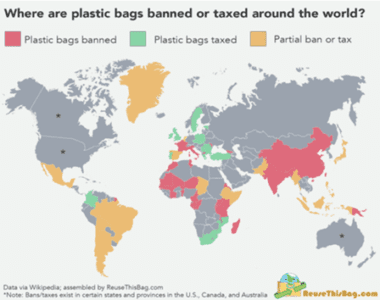Stoppage of Plastic Ban: A Positive Step to Sustainable Future
In 40 years, plastic bags have changed from miracles to threats. When Swedish engineer Sten Gustaf Thulin invented them in 1959, plastics bags were considered as a better alternative to paper bags that were considered environmentally harmful to cut down trees and prevent deforestation. Plastic bags were extremely convenient for both manufacturers / suppliers and consumers because they are lightweight, easy to manufacture, durable, waterproof, and inexpensive to ship. By the late 1980s, they had almost replaced paper bags around the world. Today, about 1 trillion plastic bags are produced every year around the world. The United States produces 100 billion plastic bags annually, and four of the five supermarket bags are made of plastic. The negative effects of using plastic bags were unpredictable until they appeared in the environment.

Currently, plastic bags are one of the three plastic products that cause plastic pollution around the world. Most disposable plastics end up in landfills, otherwise they end up in waterways. They break down into small microplastics that absorb other pollutants and are consumed by marine life. Marine organisms can mistake them for food and injure or kill them. The main challenge is that almost every plastic bag manufactured is intended for disposable use. Aside from reusability issues, the production of materials is primarily based on non-renewable resources and the recycling system is not currently set up to accept these bags. Of all plastic bags sold in the United States, only 1% are recycled. The reasons are as follows. Many recycling companies do not have the equipment needed to collect, sort and dispose of bags, and because different types of plastic are used in bags, the waste flow is not clean and bagging. Bags made of plastic are usually cheaper than recycled plastic.
According to the Marine Conservation Centre, plastic bags are one of the 12 most common debris found in coastal clean-ups. To counter this, some legislation is currently in force in more than 120 countries around the world to control the use of plastic bags. This is done either by a total ban or by imposing a consumer/manufacturer tax. Pocket bans like Kenya and Bangladesh fundamentally stop this problem. And it had a really good environmental impact on the use of plastics. But even though this movement is growing and the number of plastic bags ending up in drains and coastal side has decreased, there is still not a better replacement for them. Intending to reduce pollution, paper bags were previously thought to have a high global warming potential due to their aid in the destruction of trees and forests. But is the use of paper bags in the world environmental movement a step backward? Although there is still debate about this issue, compared to plastic, life cycle assessments have shown that paper bags do not have a lower environmental impact.
When considering alternatives, how many are resource consumption, ease of manufacture/cost, reusability, solid waste disposal, recycling, and most importantly the consequence of climate and environmental impacts? It is necessary to consider the factors. Paper bag manufacturing pollutes the environment with the energy and water consumption required to make paper bags, and the energy consumption associated with transportation is much higher than plastic. Paper bags are heavy, so fewer paper bags can be used, but they are fragile and not waterproof. One possible option is to improve the recycling rate of plastic bags to match the recycling rate of paper. The effective recycling of plastic bags shown by Canada is a good example.
In conclusion, it all comes down to balancing what the consumer “needs” with the environmental impacts. With whatever choice that is made, at the end of the day people will always need bags to use so, there will always be an environmental impact. Therefore, whether it be reusable paper or plastic bags or whatever invention that is soon to come there will be an impact.
Reference
Plastics Facts. (n.d.). Plastic Bags: Is Banning Them Doing More Harm than Good? [online] Available at: https://www.plasticsfacts.com/blog/2020/4/1/plastic-bags-is-banning-them-doing-more-harm-than-good


 by
by